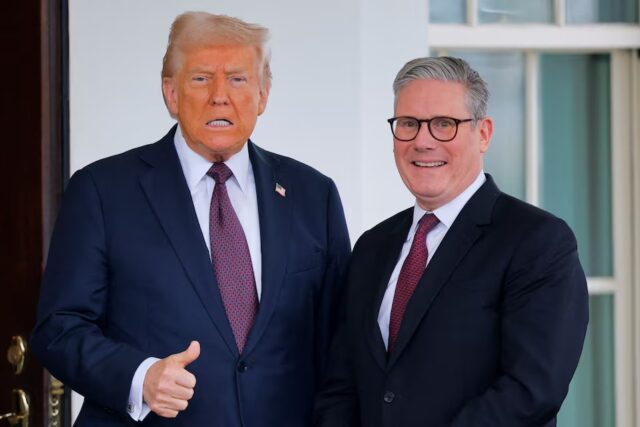
U.S. President Donald Trump and British Prime Minister Keir Starmer held their first in-person talks at the White House on Thursday since Trump reshaped U.S. policy on Ukraine, the Middle East, and global trade.
Starmer is the second European leader to meet Trump this week after French President Emmanuel Macron came to the White House on Monday for a friendly encounter that nonetheless displayed stark differences about Russia’s war with Ukraine and the U.S. push for a quick ceasefire.
The British leader arrived at the White House on Thursday afternoon, where he was greeted by the president at the West Wing entrance ahead of meetings and a news conference. Asked if the U.S. could get a Ukraine peace deal, Trump said, “Yes, we can. We will.”
Shocking Moves
Trump, who came into office on January 20, has shocked traditional U.S. allies in Europe by drawing closer to Moscow and Russian President Vladimir Putin, calling Ukrainian President Volodymyr Zelenskyy a “dictator,” and demanding payback for U.S. financial support for Kyiv.
Zelenskyy is expected to be in Washington on Friday to sign an agreement with Trump on rare earth minerals, a deal the Ukrainian leader said would hinge on further U.S. aid. Trump portrays the deal as a way to recoup American money that has been spent to support Ukraine. It includes no specific security guarantees for Ukraine, a U.S. official said.
Starmer on Wednesday urged the United States to provide a security “backstop” for any European forces that take part in a potential peacekeeping role in Ukraine, saying that would offer Kyiv a lasting peace rather than a temporary pause in violence.
UK To Increase Defense Spending
He has signaled that Britain will increase defense spending and is expected to try to reassure the U.S. president that Europe will provide support and security guarantees to Kyiv if peace talks with Russia are successful. A senior Trump administration official told reporters they were pleased with Starmer’s pledges to increase defense spending.
President Vladimir Putin on Thursday warned “Western elites” against trying to sabotage a potential rapprochement between Russia and the United States, saying Moscow would use its diplomats and intelligence services to thwart such efforts. The remarks were an apparent reference to the European Union and Britain.
Trump has shattered foreign policy and domestic policy norms since the start of his second term, rattling allies by advocating for U.S. ownership of the Gaza Strip and by promising trade tariffs on U.S. friends and foes alike.
“We would want any economic relationship with the UK to be based on reciprocal and equal trade,” the Trump aide said.
Trump’s relationship with Starmer got off to a friendly start in September with a two-hour dinner in New York at Trump Tower. The British leader’s team said the atmosphere was warm with a “gracious host.”
Rushed Peace Deal
Like Macron, Starmer will argue that a rushed peace deal with Russia, without the participation of Ukraine or European nations, might lead to further instability in Europe, which would not be good for the United States.
Starmer has said he is open to British troops providing security guarantees to Ukraine but only alongside other European nations and with “the right conditions in place”.
European countries are concerned about the high level of conflict in Ukraine now, the U.S. official said, while a ceasefire would give them more comfort that their role is more about peacekeeping than deterring active conflict.
“The type of force depends very much on the political settlement that is made to end the war,” the U.S. official said. “That trade-off is part of what the leaders today are going to be discussing.”
(With inputs from Reuters)




